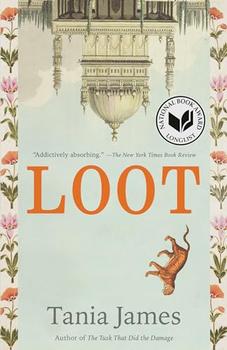Summary | Excerpt | Reading Guide | Reviews | Beyond the Book | Readalikes | Genres & Themes | Author Bio

A Novel
by Tania James
Now, as Abbas passes beneath the dangling bodies of bats, he feels as though Srirangapatna is abandoning him.
"What do you call a know-it-all who knows nothing?" Khwaja Irfan asked Abbas, the last time they met.
Abbas considered the question. "European." Khwaja Irfan laughed. "Not bad, kid."
"I'm not a kid." Abbas set his latest creation on the table. "Would a kid make this?"
It was a painted wooden horse, carrying a wooden Tipu Sultan on its back. Abbas gently turned the crank, bringing the horse to a gallop, its head easing forward and back, the legs scissoring open and closed, the tail extending like a windblown pennant.
"Shabash," said Khwaja Irfan softly, all joking set aside.
Abbas offered him a turn. Khwaja Irfan guided the handle, shy at first, then transfixed. "Maybe you do know it all," he said, bringing the horse to a stop.
While packing the toy into a straw-filled crate, Abbas asked, as nonchalantly as he could, if Zubaida Begum had said anything about the last toy.
"She liked it," said Khwaja Irfan.
Abbas paused, knowing he shouldn't ask the next question. "What does she look like?"
Khwaja Irfan raised an eyebrow. "Careful." "I'm just asking."
"Ask too many questions, my friend, and next thing you know, you're the one being questioned."
Abbas finished packing in silence and nailed the crate shut. "Here you go," he said, pushing the crate toward Khwaja Irfan, who was staring into the street, preoccupied.
When he spoke, his voice was low, almost a murmur.
Were an artist to choose me for his model—
How could he draw the form of a sigh?
"What is that?" Abbas asked.
"It's a poem she wrote." Khwaja Irfan paused in contemplation. "She is a poet, an artist. Like you."
Abbas waited for more, his chest beginning to thrum with a sweet sort of turbulence.
But then Khwaja Irfan turned away and stepped into the street, the package in his arms. Over his shoulder he called, "Khuda hafiz, Know-It-All."
Abbas muttered the poem to himself, committing it to memory. Only later (too late) did he notice the tiger-head umbrella, roaring mutely against the wall.
* * *
At the guard's prompting, Abbas climbs a set of steps and passes through a sandstone arch that delivers them into Daria Daulat Bagh. It is an ocean of a garden, populated with fruiting and flowering plants from all over the world. Pigeons flutter and coo from a domed pigeon keep, flying in and out, messages tied to their ankles.
Down the smooth stone path he proceeds, past shrubs tamed to spheres, trees whittled to points, grass clipped tight as carpet. Beyond this lies the Summer Palace, its dark maw cut by columns. He has never seen it before, only heard it described by his father. But his father neglected to mention the enormous cages that flank the entrance, each holding a replica of a tiger. So lifelike, Abbas thinks as he nears, observing the perfect stroke of each stripe, the citrine of each eye.
One of the tigers flicks its tail, causing Abbas to leap back. "That's Bahadur Khan," the guard says. "He gets edgy around feeding time."
As they pass, the tiger raises its head with an intent expression, as though undressing Abbas to the bone.
Inside the Summer Palace, painted battles span the walls, dizzy with red-coated soldiers being skewered by Tipu's cavalry. Still other walls are painted in delicate climbing vines, florals of carmine and blue.
No time to marvel. The guard directs him through forests of fragrance—sandalwood, teak—and around a corner, where they come upon a hidden staircase.
"Up," says the guard. Abbas is surprised, having assumed that the only direction he would be going is down. At the top of the landing, he finds himself in a grand pavilion propped by columns, every cornice frothing with scrolls and carvings. And there at the far end sits Tipu Sultan, leaning casually on a bolster pillow. Beneath him is a vast carpet. Above him is a finely dressed servant, stirring the air with a fan of white peacock feathers. The servant is wearing slippers.
Excerpted from Loot by Tania James. Copyright © 2023 by Tania James. Excerpted by permission of Knopf. All rights reserved. No part of this excerpt may be reproduced or reprinted without permission in writing from the publisher.
Wisdom is the reward you get for a lifetime of listening when you'd rather have been talking
Click Here to find out who said this, as well as discovering other famous literary quotes!
Your guide toexceptional books
BookBrowse seeks out and recommends the best in contemporary fiction and nonfiction—books that not only engage and entertain but also deepen our understanding of ourselves and the world around us.